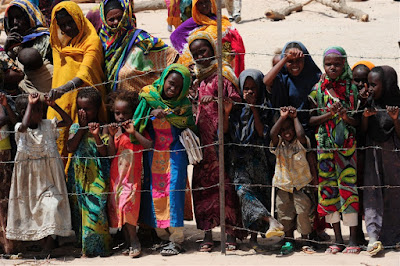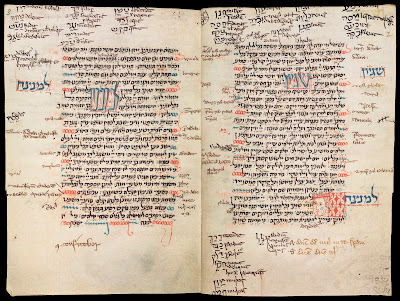Psalm 60 - O God, you have rejected us
Jump to end of psalm
To the leader: according to the Lily of the Covenant. A Miktam of David; for instruction;
when he struggled with Aram-naharaim and with Aram-zobah, and when
Joab on his return killed twelve thousand Edomites in the Valley of Salt.
1) O God, you have rejected us, broken our defenses;
you have been angry; now restore us!
2) You have caused the land to quake; you have torn it open;
repair the cracks in it, for it is tottering.
3) You have made your people suffer hard things;
you have given us wine to drink that made us reel.
4) You have set up a banner for those who fear you,
to rally to it out of bowshot. Selah
5) Give victory with your right hand, and answer us,
so that those whom you love may be rescued.
6) God has promised in his sanctuary:
"With exultation I will divide up Shechem,
and portion out the Vale of Succoth.
7) Gilead is mine, and Manasseh is mine;
Ephraim is my helmet;
Judah is my scepter.
8) Moab is my washbasin;
on Edom I hurl my shoe;
over Philistia I shout in triumph.
9) Who will bring me to the fortified city?
Who will lead me to Edom?
10) Have you not rejected us, O God?
You do not go out, O God, with our armies.
11) O grant us help against the foe,
for human help is worthless.
12) With God we shall do valiantly;
it is he who will tread down our foes.
Psalm 60
Not included in the Revised Common Lectionary.
Many of the psalms which "don't make the cut" to be read in church in the lectionary cycle present what we might call the difficult and unpleasant underside of Biblical faith.
In the New Testament letter to the Romans, the Apostle Paul asked "If God is for us, who can be against us"? This psalm describes the terrifying flip side. If God is against us, it doesn't matter who is for us.
The superscription of this psalm, one of the longest and most detailed of any psalm, attributes this to the time of David's wars. The Biblical accounts depict a series of massive battles with great slaughter (2 Samuel 8, 1 Chronicles 18).
These accounts present nothing but victories. But the prayer speaks to a very different reality. O God, you have broken our defenses, you have made us suffer. This is not the prayer of a conquering hero, but of one who has suffered loss, setbacks, and whose outcome is very much uncertain. Anger, fear... it is hard to know precisely where the psalm starts, except to know that the plaint, the cry, is rejection by God, the Trusted One, from whom all blessings flow. God has torn open the land, speaking metaphorically, but one also knows that people's lives have been ripped apart. And we fear that God is responsible for our suffering.
This is a faithful response to pain. Rather than rejecting God, this psalm turns to the Lord. It assumes God's power and authority. And, while it assumes that God's anger is the cause of this distress, it also recognizes that God is the way out.
"Give victory with your right hand, and answer us, so that those whom you love may be rescued. God has promised..."
God has promised... This we cling to. We may have doubts about God's love for us, about our our standing (for we have sinned in ways known and unknown, by things we have done and left undone). It is God's faithfulness that stands above anything we bring.
You will note the hope for reversal, even glee at the thought. Some may lift up the wish for vindication, hoping that the hated enemies be crush and humiliated. (Remember what it means to hurl your shoe at an adversary.) For many, that is an expected response to their injury, to their own shame.
But the victory is up to the Lord alone. We pray for deliverance, perhaps still more for safety: "Who will bring me to the fortified city?"
And the psalm provides an answer: "With God..." With God we find our help. With God is our vindication. With God is our hope.
Credits:
USAF Staff Sergeant Elizabeth Rissmiller, Meeto, Ethiopia - Women and children watch from a fence as members of the 402nd Combined Arms Battalion functional specialty team and local Ethiopian student nurses treat patients, May 20, 2011. The photograph is in the public domain, taken by a U.S. government employee in the performance of their duties.
* New Revised Standard Version Bible (NRSV), copyright © 1989 the Division of Christian Education of the National Council of the Churches of Christ in the United States of America. Used by permission. All rights reserved.
To the leader: according to the Lily of the Covenant. A Miktam of David; for instruction;
when he struggled with Aram-naharaim and with Aram-zobah, and when
Joab on his return killed twelve thousand Edomites in the Valley of Salt.
1) O God, you have rejected us, broken our defenses;
you have been angry; now restore us!
2) You have caused the land to quake; you have torn it open;
repair the cracks in it, for it is tottering.
3) You have made your people suffer hard things;
you have given us wine to drink that made us reel.
4) You have set up a banner for those who fear you,
to rally to it out of bowshot. Selah
5) Give victory with your right hand, and answer us,
so that those whom you love may be rescued.
6) God has promised in his sanctuary:
"With exultation I will divide up Shechem,
and portion out the Vale of Succoth.
7) Gilead is mine, and Manasseh is mine;
Ephraim is my helmet;
Judah is my scepter.
8) Moab is my washbasin;
on Edom I hurl my shoe;
over Philistia I shout in triumph.
9) Who will bring me to the fortified city?
Who will lead me to Edom?
10) Have you not rejected us, O God?
You do not go out, O God, with our armies.
11) O grant us help against the foe,
for human help is worthless.
12) With God we shall do valiantly;
it is he who will tread down our foes.
Psalm 60
Not included in the Revised Common Lectionary.
Many of the psalms which "don't make the cut" to be read in church in the lectionary cycle present what we might call the difficult and unpleasant underside of Biblical faith.
In the New Testament letter to the Romans, the Apostle Paul asked "If God is for us, who can be against us"? This psalm describes the terrifying flip side. If God is against us, it doesn't matter who is for us.
The superscription of this psalm, one of the longest and most detailed of any psalm, attributes this to the time of David's wars. The Biblical accounts depict a series of massive battles with great slaughter (2 Samuel 8, 1 Chronicles 18).
These accounts present nothing but victories. But the prayer speaks to a very different reality. O God, you have broken our defenses, you have made us suffer. This is not the prayer of a conquering hero, but of one who has suffered loss, setbacks, and whose outcome is very much uncertain. Anger, fear... it is hard to know precisely where the psalm starts, except to know that the plaint, the cry, is rejection by God, the Trusted One, from whom all blessings flow. God has torn open the land, speaking metaphorically, but one also knows that people's lives have been ripped apart. And we fear that God is responsible for our suffering.
This is a faithful response to pain. Rather than rejecting God, this psalm turns to the Lord. It assumes God's power and authority. And, while it assumes that God's anger is the cause of this distress, it also recognizes that God is the way out.
"Give victory with your right hand, and answer us, so that those whom you love may be rescued. God has promised..."
God has promised... This we cling to. We may have doubts about God's love for us, about our our standing (for we have sinned in ways known and unknown, by things we have done and left undone). It is God's faithfulness that stands above anything we bring.
You will note the hope for reversal, even glee at the thought. Some may lift up the wish for vindication, hoping that the hated enemies be crush and humiliated. (Remember what it means to hurl your shoe at an adversary.) For many, that is an expected response to their injury, to their own shame.
But the victory is up to the Lord alone. We pray for deliverance, perhaps still more for safety: "Who will bring me to the fortified city?"
And the psalm provides an answer: "With God..." With God we find our help. With God is our vindication. With God is our hope.
Credits:
USAF Staff Sergeant Elizabeth Rissmiller, Meeto, Ethiopia - Women and children watch from a fence as members of the 402nd Combined Arms Battalion functional specialty team and local Ethiopian student nurses treat patients, May 20, 2011. The photograph is in the public domain, taken by a U.S. government employee in the performance of their duties.
* New Revised Standard Version Bible (NRSV), copyright © 1989 the Division of Christian Education of the National Council of the Churches of Christ in the United States of America. Used by permission. All rights reserved.




Comments
Post a Comment